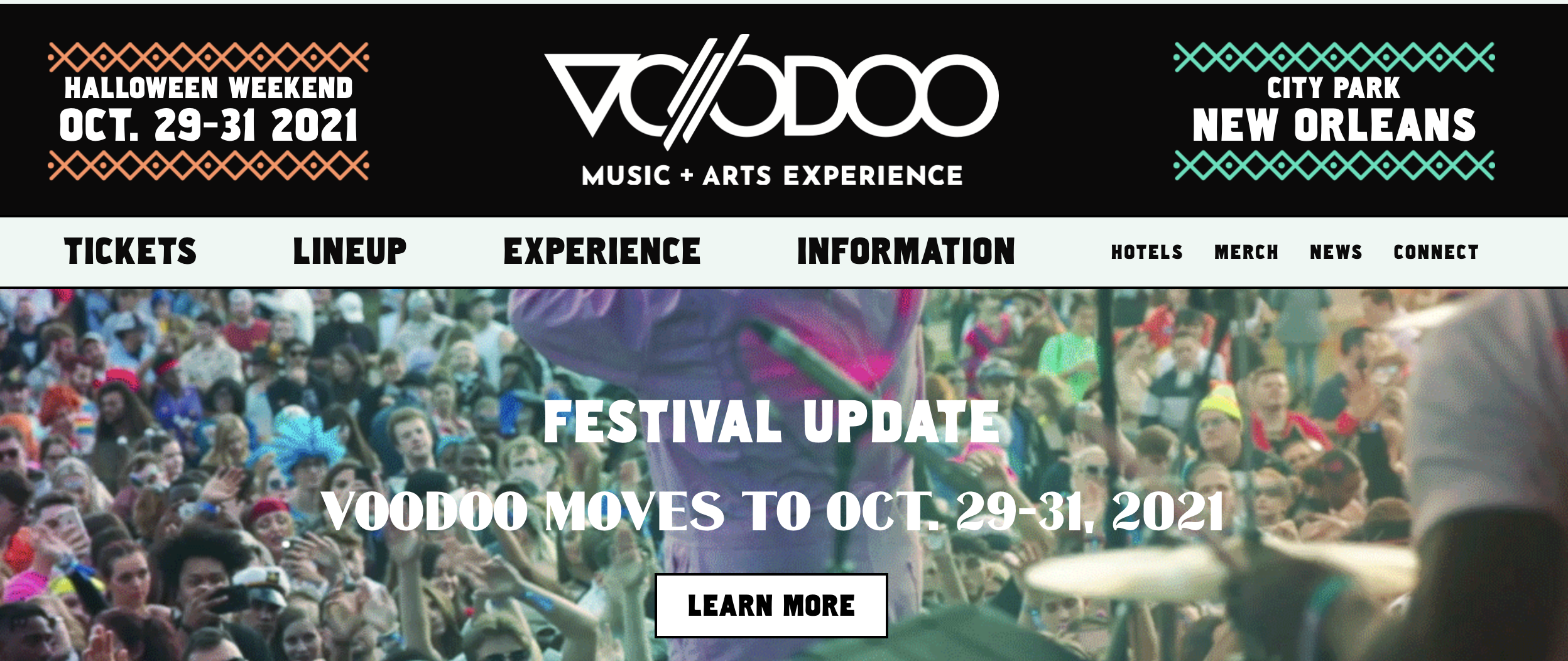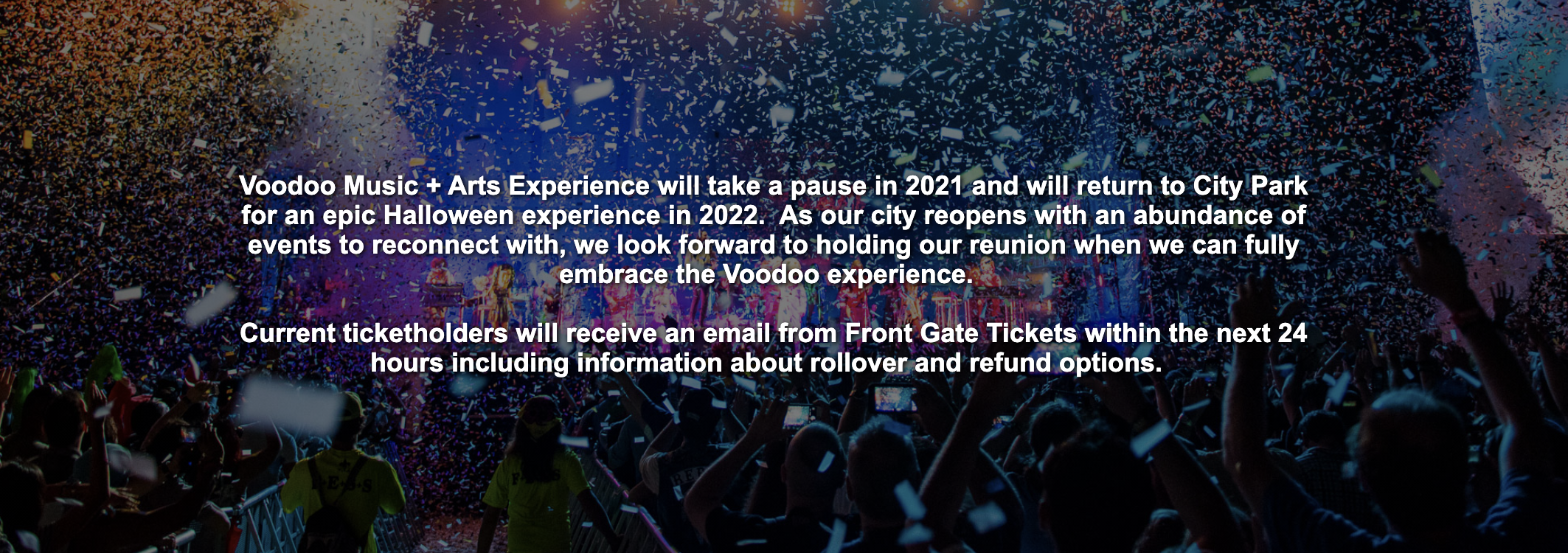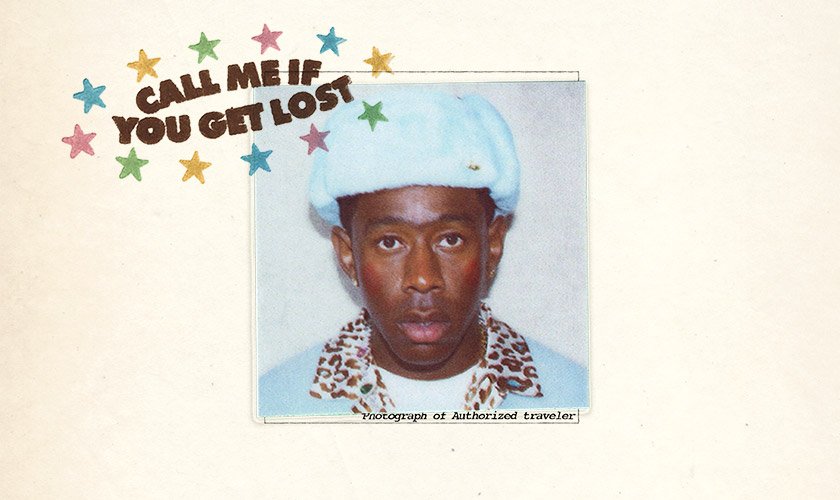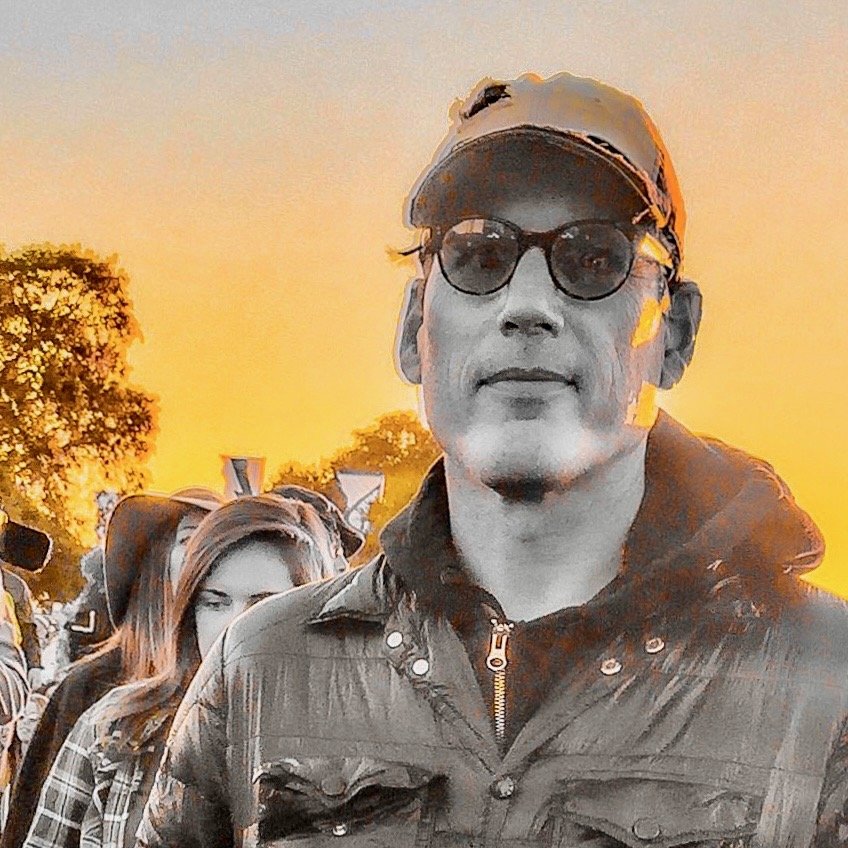Goodbye Voodoo?

From VoodooFestival.com
Is the New Orleans rock festival now in its second year of self-imposed absence done? And if so, what does it say about the festival business?
If this year followed the timeline established in previous years, we would have seen a lineup for the Voodoo Music + Arts Experience a week ago Monday and weekend ticket packages would have gone on sale last Friday. We didn’t get either, but around 3:45 last Friday afternoon, Voodoo announced through its social media and website, “Voodoo Music + Arts Experience will take a pause in 2022. Take care of your Krewe and follow along on social media for updates.”
Since Voodoo’s social media had been silent in the year between this announcement and the one made a year before saying that Voodoo would “take a pause” that year and “return to City Park for an epic Halloween experience in 2022,” the two posts appeared right on top of each other on Voodoo’s Facebook page. Together, they gave fans a reason to read the newer announcement skeptically. Fans understandably wondered why Voodoo was taking another year off when Buku, Jazz Fest and Hangout have all taken place already in the region, and the country as a whole is planning an active festival summer.
In all likelihood, Voodoo is dead. It was a very bad sign in December when it refunded ticket purchases from the pandemic years without being asked, and the ticketing agency sent a message that read, “Unfortunately, Voodoo Fest has canceled their 2022 event. All tickets purchased through Front Gate Tickets for Voodoo 2022 are being refunded in as little as 30 days to the original method of payment.”
That comment didn’t come from C3 Presents, which produces Voodoo, and its silence until Friday left the door open a hair. Maybe something was happening, though giving back money that would be needed to book artists made that seem unlikely.
Now we know. 2022 will be the third year without Voodoo and three years since we’ve had any reason to be invested in Voodoo. COVID shut down touring in 2020 before it had time to announce a talent lineup, and Voodoo tapped out early in 2021 before it had a chance to make news with a list of potential headliners. Really, it’s a testament to Voodoo’s ability to make it part of the fabric of the city that as many people are upset enough to comment on the statement since the festival has been absent since the gates closed at the end of Voodoo 2019.
Three years off means that when/if Voodoo returns, it will be effectively starting over as a new festival, even if it returns with the Voodoo name. Reinvention was always part of the Voodoo story though, so anything’s possible. If it is truly done though, it’s worth thinking about those changes and what they tell us about the festival business.
When Voodoo launched in 1999 as a one-day event, it picked up where the local alternative rock radio festivals left off. Zephyrfests and Endfests presented local and national alternative rock bands in City Park’s Marconi Meadows through most of the ’90s with single-day festivals tied to local alternative rock radio stations. Voodoo’s first lineups addressed that market, featuring Third Eye Blind, Moby and Wyclef Jean in the first year, and Stone Temple Pilots, Eminem, Ben Harper, Tool, Snoop Dogg, Bush, Missy Elliott among others in the years that followed. Voodoo quickly grew into a multi-day festival in Marconi Meadows that folded a variety of New Orleans musicians and sounds into the predominantly modern rock radio sound.
Voodoo was independently owned and operated, not directly affiliated with national promoters or radio station chains. When I first interviewed founder/promoter/booker Stephen Rehage for a story for The Memphis Flyer on Voodoo 2005 moving to Memphis, he wanted me to make it clear to readers that this wasn’t a ClearChannel event, which at the time felt like a way of adjusting expectations in a city that had no background with the festival. The heyday of the alternative rock that gave Voodoo its identity had passed, and it didn’t have the kind of pipeline or finances to funnel that year’s hitmakers into a Voodoo lineup. Instead, he had Nine Inch Nails for star power, a past-their-moment Cake, the reunited New York Dolls, N. Mississippi Allstars, Better Than Ezra, and Secret Machines on a bill that, like many Voodoo lineups, was clearly the product of a singular sensibility. To be fair, he had also booked Flaming Lips and Foo Fighters for Voodoo that year, but the uncertainty created by Hurricane Katrina caused them to cancel.
The eccentricity of Voodoo lineups became one of its calling cards. You could see artists on small stages on their way up including Janelle Monae, Drive-By Truckers, and Snow Patrol, and mystifying headliners like Ozzy Osbourne and Friends, booked to salvage a Black Sabbath reunion that fell apart when Sabbath guitarist Tony Iommi had medical issues. At some point, Voodoo committed to the idea that Saturday nights were for guitar-forward, metal-leaning bands, which led to some good nights and some brutal ones, including a very cold Saturday night in 2009 when so few people still thought that Kiss on Halloween was cool that the “crowd” barely reached the soundboard. Black T-shirt Saturdays continued until 2019 when—on Friday—Guns ’N Roses, occupied that space, briefly slowing down the younger members of the crowd long enough to dance to “Paradise City” before mentally checking that band dad likes off their mental been there/done that list and moving on to Big Gigantic at Le Plur, the festival’s electronic dance stage.
Voodoo’s high point in terms of cultural caché likely came from 2007 to 2012 when it moved to City Park’s Roosevelt Mall. In the years after Hurricane Katrina, Voodoo doubled down on its connection to New Orleans. It staged a one-day version of the festival on the Fly for people working in New Orleans in October 2005, and in 2006, the headlining Red Hot Chili Peppers were booked specifically with the idea of getting a jam with The Meters as part of the show. Voodoo tried to expose its teenaged target audience to New Orleans music and culture and created a row of three small stages that focused on New Orleans music. As a business proposition, those stages gave Jazz Fest fans a reason to go to Voodoo, and they created places for The Kinks’ Ray Davies, X, and Cheap Trick to play, in addition to a broad selection of New Orleans artists including Irvin Mayfield, blues singer Marva Wright, and Walter “Wolfman” Washington. Preservation Hall collaborated with Voodoo to create The Bingo! Parlour, with a sensibility defined by Clint Maedgen’s The Bingo! Show. The booking often had a Frenchmen Street leaning with an affection for theatrical music, and in 2009, it was center of an effort to set the Guinness record for largest gathering of zombies that, sadly, failed.
But the New Orleans stages didn’t sell enough tickets on their own to pay the acts that played them, and eventually the busy Preservation Hall people moved on to other enterprises. The stages were a fondly remembered by those who found an outpost for older music fans at a festival aimed at young people, but they were an expensive value-add for people who bought tickets to see Rage Against the Machine, Eminem, Drake, Muse, and other headliners.
Unfortunately, those years on Roosevelt Mall coincided with major changes in the music industry that would be tough for any festival to manage. The audience for guitar rock was declining, as was its place on the radio and in the marketplace. On the other hand, techno, house and dubstep were growing rapidly. Voodoo had two rock stages for much of its run to that point, but in 2010, it shut one of them down in favor of Le Plur, the electronic stage, which would feature Paul Van Dyk, Steve Angello, and Skrillex among others in its early years. The move made sense because more rock bands didn’t translate to more ticket sales, where as Le Plur sold tickets to people who otherwise weren’t going to Voodoo. Still, the change pissed off the faithful who missed being superserved by a festival tailored to their aesthetic preferences.
The realities of the festival market forced the change, and it helped Voodoo’s attendance, even if that wasn’t always clear. The Roosevelt Mall footprint allowed Voodoo to spread out to such a degree that it rarely felt crowded. For a year or two, Le Plur was tucked away in a clearing that could barely be seen from any other stage, so while it drew substantial crowds that attended almost solely for dubstep, it was easy for those who showed up for Metallica or Stone Temple Pilots to think the move was a waste because that crowd couldn’t be seen.
In 2013, City Park moved Voodoo to the Festival Grounds, space it developed with festivals in mind. Its drainage was so bad that Hogs for the Cause bailed on it after a year, and the move to the smaller footprint was hard on Voodoo. The fondly remembered New Orleans stages were lost in the move, and even with fewer stages, the soundbleed from stage to stage was brutal. The stages needed to be oriented to minimize their impact on the surrounding neighborhoods, but that meant that they fought with each other. An all-star band came together to play music from Dr. John’s Night Tripper era, but The Cure playing on the nearby main stage made much of the show hard to hear.
That smaller footprint forced some tough booking choices, and Voodoo lost a lot of love from the New Orleans music community when its local bookings dropped to the lowest levels in the festival’s history. Voodoo eventually dealt with the soundbleed issues by alternating stages, having the smaller ones silent while the main stage was active, and vice versa. That again cut the number of slots for any bands and in particular New Orleans bands as Voodoo went from six acts per stage in 2013 to five on Friday and Saturday in 2019 and four on Sunday. With a limited number of sets to fill, emphasizing artists that fans in New Orleans couldn’t see anytime made sense.
In early October 2013, Rehage sold 51 percent of Voodoo to Live Nation, where he took on the title of President of North American Festivals. That arrangement lasted until 2016, when Live Nation parted ways with Rehage and brought in Austin-based C3 Presents, which also produces Lollapalooza and ACL. The homemade feel of Voodoo that was part of the festival’s sometimes frustrating charm disappeared with the move to C3. If not for the site and a few New Orleans-specific touches, Voodoo under C3 felt like it could have been in Cincinnati or Birmingham or countless other cities. While that was an aesthetic negative, the change produced a consistent uptick in attendance. It turns out that the basic truth that people gravitate to the biggest stars proves as true in festival production as it is in anything else, and betting on current stars instead of ones that peaked in the ’90s or 2000s was good business.
It helps that C3 focused the festival primarily on its young target audience and made little effort to court the older Jazz Fest regulars or fans of the Endfest or Roosevelt Mall days. While that seems short-sighted, the narrower focus made the festival cooler. Nobody wants to go get high or crazy around mom and dad or people their age. Besides, older audiences had a harder time being on site for the day, which means that they didn’t spend as much money as the core audience at the festival. Much of the older crowd for Guns ’N Roses showed up just for Guns ’N Roses and likely had dinner and drinks somewhere else instead of buying them at Voodoo. That might be sensible, but the festival makes money on food and drink sold, so younger fans who can spend the day there are better for business.
Older fans also have responsibilities. When Kiss played in 2009, it was October 31, and it’s very possible that many Kiss fans that would have attended had to deal with their kids and trick-or-treating.
So why now? That’s not clear. Voodoo has not been accused of oversharing, communicating rarely and tersely, so much of what we know comes from sorting through the evidence. I’ve heard rumor of issues with City Park, and that’s plausible, but that would explain a venue change, not a two-year absence.
The answer is likely a simple and disappointing one: that Live Nation and C3 Presents have concerns about Voodoo as a moneymaker. Music festivals are expensive ways to make money. The growth of the festival business says that there’s a lot of money to be made, but promoters have to lay out a lot of money to make it starting with artists’ contracts that have become more expensive as recorded music becomes a less lucrative revenue stream. The cost of festival production has been going up, and this year it is particularly bad for familiar reasons. The price of fuel affects the cost of everything that has to be trucked or flown in, and supply chain issues complicate things further. According to Daniel Nickleski, the COO of concert and event producers Sound Works Production, they can’t get the chips they need to meet the sound, light, and video demands of concerts and tours.
"The chip shortage is probably one of the biggest supply chain issues we're seeing.” Nickleski said. “It also trickles down to the labor shortage that can't keep up with supply and demand right now, because everything just kind of opened up at once.”
The touring shutdown of 2020 forced a lot of production companies to lay off staff, and the time it took to finally get touring restarted in earnest gave many workers time to find other jobs. That leaves companies shorthanded for good, experienced talent, and those who have those qualities cost more to employ now.
Add inflation to those factors and the margins for a reasonable return on investment have become so thin that a rainy day—not even a rain out—could be the difference between making and losing money. This is one place where Live Nation’s ownership of Voodoo might work against the festival. It’s easy to imagine that Rehage, who lived near City Park, would feel the importance of putting on Voodoo in 2022 in a more personal and emotional way than a company based in Los Angeles with 29 other festivals going on around the country this year. That doesn’t mean Voodoo 2022 would have been a better business decision for Rehage than it would have been for Live Nation, but you could imagine him weighing other, intangible factors more heavily than it does.
On April 26, Lollapalooza announced its lineup with Metallica, Dua Lipa, J. Cole and Green Day headlining, and it has effectively sold out. Two weeks later, ACL announced its 2022 lineup, which includes headliners Red Hot Chili Peppers, Pink, The Chicks, SZA, Kacey Musgraves, Flume, Paramore, and Lil Nas X, and many tiers of ACL’s weekend ticket packages have already sold out. Coachella had such a good year this spring that it is putting presale tickets for 2023 on sale Friday.
Those successes don’t mean the festival business is uniformly strong though. Promoters in England have been concerned that fans simply don’t have enough disposable income to attend the festivals that they once would have, and that they’re buying tickets to the biggest festivals. Here in the States, Bonnaroo’s ticket sales have struggled in recent years, and they have been soft this year as well.
In 2021, the cancellation announcement promised a return in 2022. This year’s announcement doesn’t, which is a bad sign. If nothing else, it says that the future of Voodoo is more in doubt than it was a year ago. Fans on Facebook noticed that and jumped to an understandable conclusion. “Tell us you’re done without telling us you’re done,” one poster wrote. “A thanx for the good run post would be better than this.”
If in fact Voodoo is done, the say-as-little-as-possible statement will be the sad, final chapter of the story. Throughout 2020 and 2021, its social media did nothing to give fans a reason to stay connected to Voodoo. When Keith Spera reported in the New Orleans Advocate about ticket refunds, it said nothing to reassure fans, alleviate confusion or even acknowledge that they existed. At this point when Voodoo has taken a second self-imposed year off, the only human sentiment the spokespeople could muster was the admonition that we should “take care of your krewe,” which seems like precious little after all this time.
Festivals, even ones that have wobbled and creaked like Voodoo, become part of the fabric of people’s lives, and festivals count on that connection. Pre-pandemic, Voodoo would put ticket packages on sale at discount prices each December, well before the lineup was announced. At that point, they were selling tickets on the Voodoo name and reputation to fans who figured that, based on previous years and good will, there would be enough there to like to make it worth buying early at a bargain price. It’s a sign of how fondly previous years are remembered that posters on social media could still feel jobbed by a festival that last acted in 2019.
Voodoo doesn’t have Threadheads and the kind of broad, cultural embrace that Jazz Fest enjoys, but it has been an important part of a lot of music fans’ lives. To seemingly ghost on us as it has for the last two years and may be doing now is callous and disappointingly corporate. If it’s really over, a goodbye will be sad but fine. And, realistically, another promoter will likely try to fill that calendar space with another festival. If Voodoo plans to be back in 2023, we really need information more than once every 365 days to to keep us invested.
Creator of My Spilt Milk and its spin-off Christmas music website and podcast, TwelveSongsOfChristmas.com.






